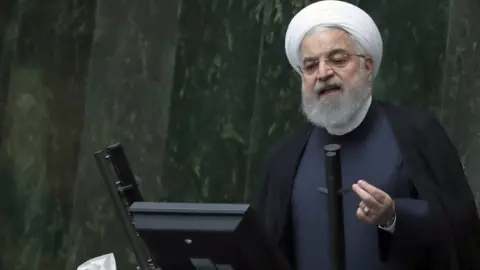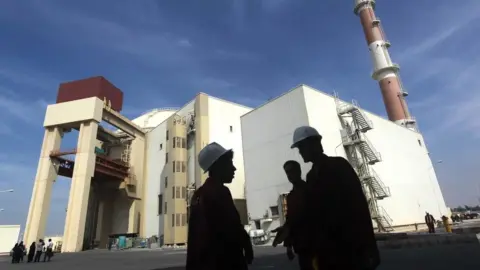Iran nuclear deal: Rouhani rules out bilateral talks with US
 EPA
EPAIran's president has ruled out ever holding bilateral talks with the US.
"There have been a lot of offers for talks but our answer will always be negative," Hassan Rouhani told MPs.
But he said Iran would agree to resume multilateral talks if all US sanctions on Iran were lifted.
US President Donald Trump has said he is open to renegotiating a 2015 nuclear deal between Iran and world powers which Mr Trump unilaterally abandoned last year, reinstating sanctions.
The deal's other parties - the UK, France, Germany, China and Russia - have attempted to keep it alive. But the sanctions put in place by Mr Trump have caused Iran's oil exports to collapse, the value of its currency to plummet, and sent inflation soaring.
In July, after Mr Trump tightened the sanctions on Iranian oil exports in an attempt to force it to negotiate, Iran suspended two commitments enshrined in the deal.
Mr Rouhani has threatened a third, unspecified step unless European countries take action by Thursday to shield the Iranian economy from the sanctions' effects.
At the G7 summit last week, French President Emmanuel Macron said he was "convinced that an agreement" could be found if the US and Iranian presidents were to meet.
Mr Trump said Iranians were "hurting badly" and that he thought Mr Rouhani was "going to want to meet and get their situation straightened out".
The next day, Mr Rouhani signalled that he was ready for dialogue if the US first lifted its sanctions.
But in a speech to parliament on Tuesday, he ruled out a bilateral meeting. "The issue of bilateral talks is not on the agenda in principle," he said.
"If America lifts all of its sanctions - I believe it does not matter whether it returns to the [nuclear deal]; what is important is the sanctions - there still is a chance for America to attend meetings of the P5+1 like in the past," he said, referring to the group of powers that negotiated the 2015 accord.
"But this will only be possible provided that it lifts all sanctions," he added,
Mr Rouhani also warned Europeans countries that they had until Thursday to honour their promises to uphold the economic benefits of the nuclear deal.
"If Europeans can purchase our oil or pre-purchase it, and we can have access to our money, that will ease the situation and we can fully implement the deal," he said. "Otherwise we will take our third step."
French President Emmanuel Macron has reportedly proposed setting up a $15bn (£12.5bn) line of credit for Iran, secured by oil, in return for its full compliance with the nuclear deal. That would allow Iran to obtain foreign hard currency.
 AFP
AFPIn July, inspectors from the International Atomic Energy Agency (IAEA) confirmed that Iran had begun enriching uranium above the 3.67% limit set by the nuclear deal and had exceeded a 300kg (660lb) limit on its stockpile of enriched uranium.
Low-enriched uranium, which has a 3-5% concentration, can be used to produce fuel for nuclear power plants. Weapons-grade uranium is 90% enriched or more.
On Monday, an Iranian foreign ministry spokesman said the third step would be "stronger than the first and the second steps", but he gave no further details.
Analysts suggested the country might start enriching uranium to 20% concentration, which would shorten its so-called "break-out time" - the time required for it to produce enough fissile material for a bomb if it chose to do so.
Iran insists that its nuclear programme is exclusively for peaceful purposes.
